Statement of the Zaborona editorial team:
The article below caused a heated discussion in Ukrainian society and a keen reaction from the StopFake organization. We have analyzed and collected open source facts that testify to the warm relationship between StopFake employees and Ukrainian far-right white supremacists. At Zaborona, we believe this a matter of public importance, since StopFake is one of the two Ukrainian partners in Facebook’s fact-checking program. Their job is to check posts for fakes and manipulations. This is how it works according to Facebook policies, as we were recently told by Facebook officials: “If our independent third-party fact-checkers mark a post as false, we reduce its distribution in the News Feed, but do not remove it”. Once the post is marked as fake, Facebook warns users that the information is false before they share it. In addition, pages and domains that regularly distribute fakes will lose the ability to monetize content and advertise.
The distribution of fake news about Ukraine — which painted a fake picture of what was happening in Crimea and Donbass, including a narrative about “rampant fascism” — was one of the vital components of Russian propaganda back in 2014–2015, which led to a war that continues to this day. Back then StopFake’s efforts to tackle Russian and pro-Russian misinformation played, in our opinion, a very important role in saving Ukraine’s democracy and statehood. This is evidenced by the numerous prestigious awards received by the organization, and a good reputation among its audience and donors.
While trying to figure out the reasons behind the removal of Zaborona’s post on Facebook about the well-known Russian neo-nazi Denis Nikitin’s business in Ukraine, we found out that some Ukrainian fact-checkers are closely connected with influential figures in white supremacist circles. One of the co-founders of StopFake, Evgeny Fedchenko, openly supports C14, an organization known for their involvement in Roma pogroms, attacks on journalists and the LGBTQ communities. Such relationships raise questions about the impartiality of fact checkers and the possible impact of such friendships. We were also curious if anyone from StopFake shared their friends’ views.
However, Facebook officially replied to us that our post “was removed in error by us [Facebook], and was not related to any third-party fact-checking engagements. The post has since been restored”.
Before posting the article, we tried to reach out to StopFake representatives for comments, but they preferred to ignore our requests. Shortly after the release, the StopFake supervisory board issued a statement in which they called Zaborona’s journalism “a continuation of the ongoing pro-Russian persecution of the StopFake team, in order to discredit the project.” The organization accused Zaborona of “attacking freedom of speech” (sic!).
In addition, StopFake appealed to Facebook leadership “with a request to jointly develop strategies for protecting partner organizations, because in the conditions of an information war, every fact-checking organization that confronts antidemocratic phenomena in the information space and defends the truth may face such problems.”
We consider such statements to be destructive to the development of independent investigative journalism in Ukraine; any accusations of “pro-Russian persecution” are unacceptable. However, we are sure that the topic that we’ve raised here is worth discussing, and we are ready to give our platform to the people mentioned in the article.
Zaborona media was first launched in 2018 by award-winning journalists Katerina Sergatskova and Roman Stepanovych. Sergatskova received the Kurt Schork Award in 2015 for her frontline reporting on Donbas, and the FPA — for her coverage of “Islamic State” issues. Stepanovych is an internationally distinguished producer. In 2018, he produced the Peabody and NPC award-winning “Inside Putin’s Russia” series for PBS Newshour. Learn more about us.
Facebook Blocked Zaborona for Neo-nazis Critic. It Turned out that Ukrainian Fact-Checkers of the Social Media Network Have Close Ties with Them
This article was published on 3 July 2020 on zaborona.com
In early 2020, Facebook chose two partners in Ukraine to counter fake news and misinformation — in addition to VoxCheck, the social network opted for StopFake — an Internet project that has been exposing Russian propaganda since 2014. This decision seems ambiguous, as StopFake representatives are also friends with well-known far-right figures, including those convicted of hate crimes. Zaborona’s author Samuel Proskuryakov explains why the appointment of StopFake could turn out to be a problem.
This story begins on June 2, when Zaborona published an article about Denis Nikitin. He is a Russian football hooligan, the founder of the popular far-right brand White Rex and one of the main neo-Nazis in Europe, who has lived in Ukraine in recent years.
A post with a link to the material appeared on our official Facebook page in the evening. The article was liked by our subscribers. It was actively discussed and disseminated. 18 hours later, however, the publication disappeared from the page, our moderator was banned, and the public was restricted in monetization. We didn’t know why, but we wanted to learn more, and repost the article. Some of our readers suggested looking for possible answers from Facebook’s newest partner in Ukraine — the online project StopFake. And although the social network later explained that the post was deleted by mistake, and it was put back online the next day, we discovered some interesting things.
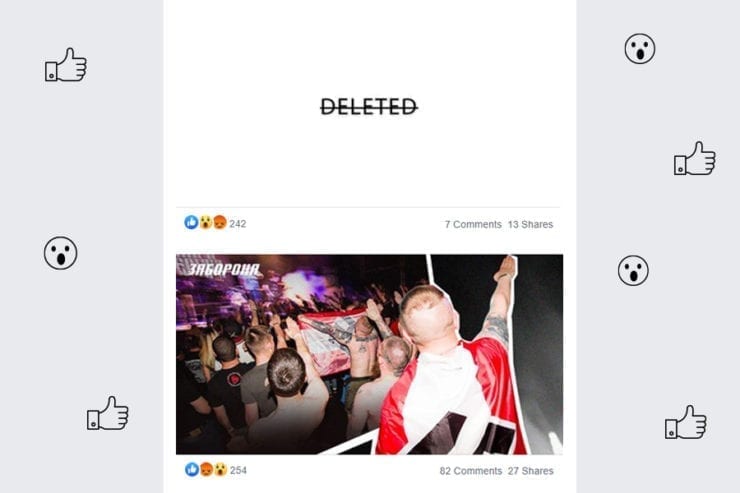
What is StopFake?
This project was created in 2014 by students and teachers at the Kyiv-Mohyla School of Journalism. StopFake exposes false information and enjoys the trust of many leading Western media outlets. The project once refuted Russia’s Channel One news story, in which they falsely reported that a Ukrainian military plane had shot down Malaysian Boeing flight MH17 near Torez, in Donetsk region. The StopFake investigation proved that the satellite images shown by the TV channel were fake.
In 2016, the project was included in the list of the Financial Times “New Europe 100” — a list of people and organizations that help change society for the better. StopFake’s sponsors include the Czech Ministry of Foreign Affairs, the British Embassy in Ukraine, the US-funded National Endowment for Democracy, and the International Renaissance Foundation.
On March 27, 2020, StopFake became a member of the fact-checking program at Facebook. It will help social networks in the fight against fake news and misinformation. It will look like this: if a fact-checking expert marks information as fake, it appears as such in the news feed below, which reduces the spread of inaccurate content and minimizes the number of views. After tagging a post, Facebook warns people who see it or want to share it that the information is inaccurate. In addition, pages and domains that regularly distribute fakes lose the ability to monetize content and place ads.
StopFake and far right
Initially, a press release from Facebook about their choice of Ukrainian partners was shared on Twitter by Christopher Miller, an American journalist who writes for BuzzFeed. He stressed that the fight against misinformation is good, but only in theory. According to him, StopFake’s participation in this process should be a cause for concern. “StopFake employee Yevhen Fedchenko [one of the founders and editor-in-chief of the project, director of the Kyiv-Mohyla School of Journalism] opposes freedom of the press and news that criticizes the government or does not use the language he believes should be preferred,” said Miler.
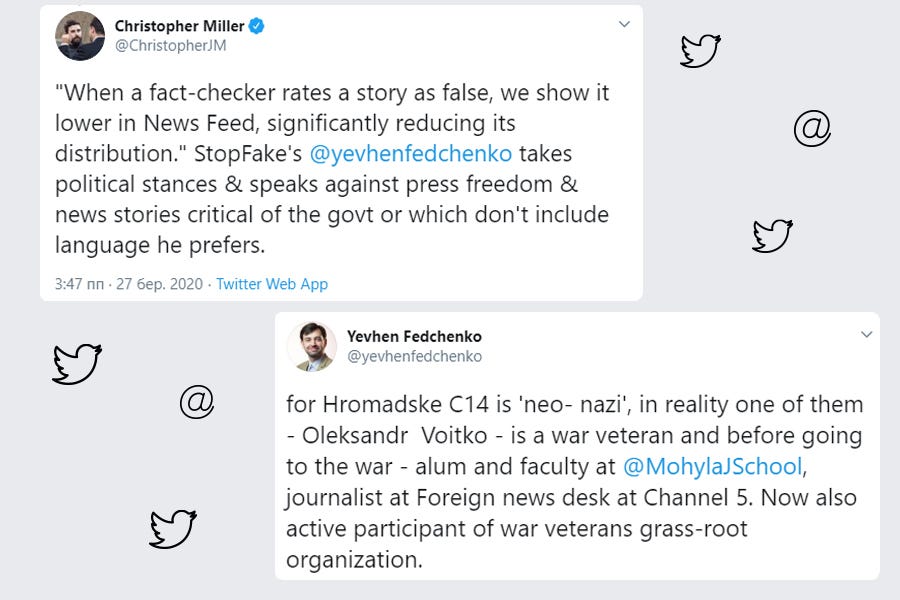
Yevhen Fedchenko has also supported some far-right public figures. For example, in 2018, he criticized a post on Hromadske about C14 members’ detention of Brazilian militant Rafael Lusvarga, who fought on the side of the separatists in Donbas. Hromadske called the group “neo-Nazi”, which is why C14 filed a lawsuit “in defense of honor, dignity and business reputation.” In August 2019, the court upheld the lawsuit of right-wing radicals.
Fedchenko noted on Twitter that one of the “neo-Nazis” Oleksandr Voitko, who detained Lusvarha, was a veteran of the war in Donbas, a Channel 5 journalist, a graduate and teacher at the Kyiv-Mohyla School of Journalism. The correspondent for the French newspaper Le Figaro, Stéphane Siohan, wrote at the time that Fedchenko was trying to whitewash C14’s image only because his colleague Voitko was a member of the organization.
There were other situations. In 2016, the data of more than four thousand journalists who received accreditation from the so-called “LPR” and “DPR” were published on the website “Peacemaker”. It is a project that emerged in 2014 as an open base for separatists and their supporters. One of the initiators of its creation was the then adviser, and now Deputy Interior Minister Anton Gerashchenko. The publication of these journalists’ names, including representatives of the world’s leading media (eg, Associated Press, AFP, Al Jazeera), led to an international scandal. After all, the site posted not only names and surnames, but also mobile phones, e-mail addresses and even some passport data. Many of these journalists were accused of “collaboration with terrorists” and received threats. Accreditation in unrecognized republics is a necessary step for those in the media who want to cover what is happening there.
In the conflict mentioned, Fedchenko sided with Peacemaker. He claimed that the responsibility for the backlash lay solely with the media themselves. “Before the journalists published the information about the leak, no one knew about Peacemaker’s website,” Fedchenko said, adding that the scandal seemed “absolutely insignificant and inflated by many journalists.
Christopher Miller also wrote that the UK had cut funding for StopFake “due to concerns about fact-checking capabilities and public comments from co-founder Fedchenko, who is attacking journalists and freedom of the press.” Zaborona partially refuted this information.
The press service of the British Embassy in Ukraine told us that they supported StopFake in 2015–2018, “and we are proud of the results it has achieved so far.” Changing project partners from one year to another is a common practice — StopFake, according to the press service, has reached the planned level, and the need for its support has disappeared, but the embassy cooperates with the online resource in other areas. “StopFake experts continue to work with the Study and Distinguish Media Literacy Project, implemented by the International Research and Exchanges Board (IREX) with the support of the British and US embassies in partnership with the Ministry of Education and Science of Ukraine. The United Kingdom supports anti-disinformation activities and programs aimed at developing media literacy in Ukraine and in the wider region”, the press service said.

Marko Suprun and the “brothers”
The main face of StopFake is Marko Suprun, the husband of Ulyana Suprun, the former acting Minister of Health. The English version of the project’s YouTube channel consists almost entirely of videos with him. Suprun analyzes Russian fakes, in particular those about the “rampant” fascism in Ukraine. But Marko himself can often be found in the company of odious right-wing radicals.
September 2017. Suprun was invited to an event held by the Youth Nationalist Congress. There he told what made him move from Canada to Ukraine and how to “get rid of one’s inferiority complex.”
Two chubby men stood on the stage next to Mark. The first is the founder of the popular far-right clothing brand SvaStone and the leader of the musical hatecore band Sokyra Peruna, Arseniy Bilodub. The second is the frontman of the rock band Komu Vnyz Andriy Sereda, who once said that he, Marko Suprun and Bilodub were born through the Cossack ritual of “brotherhood”, which involves bloodletting. Therefore, on the site “To Whom Down” speakers are marked as “brothers”.
Sokyra Peruna is one of the most popular bands among right-wing radicals. Their song “Six Million Words of Lies” denies the Holocaust. And the track “August 17th” is dedicated to the day of death of the Nazi figure Rudolf Hess (he was the last of the Nazi leaders to die). In 2018, Zaborona made a photo reportage of Sokyra Peruna’s anniversary concert, where Nazi flags and swastikas were on display. According to this report, the police opened a criminal case. We used the photos from that concert as illustrations for the investigation into the neo-Nazi Denis Nikitin, a link to which Facebook removed from Zaborona’s page some time after the publication.
The “Perunists” themselves position their work as white power rock. This musical direction promotes the ideas of racism, anti-Semitism and homophobia through lyrics and stage images and, according to experts from the Australian Commission on Human Rights, is an important tool of the international neo-Nazi movement to generate income and recruit new supporters.
The former drummer of Sokyra Peruna, Dmitry Volkov, once served a prison sentence for participating in a pogrom of the Brodsky synagogue in Kyiv. The band’s concerts were attended in 2017 by Russian Alexander Skachkov, who was recently detained by Ukrainian special services for promoting the ideas of Australian terrorist Brenton Tarrant.
In an interview, Andriy Sereda, the frontman of Komu Vnyz, admitted that he considered himself a “selective anti-Semite”. At the celebration of the 20th anniversary of the far-right Svoboda party in 2011, the musician was invited to the microphone and said that Ukrainian land was the “motherland of the Aryan race.” He ended his speech with a gesture very similar to a Nazi salute. He has a tattoo on his arm in the form of a Celtic cross, which is used by skinheads, racists and neo-Nazis to denote the superiority of the white race. This symbol also appears in photos from the band’s rehearsal spot.
Arseniy Bilodub and Andriy Sereda are the “patriarchs” of the Ukrainian far-right scene. Sokyra Peruna and Komu Vnyz have long and fruitfully made friends, performing at numerous “patriotic” festivals and concerts with other right-wing radical music groups, including the Russian black metal band “M8L8TH”. The name stands for “Hitler’s hammer”, where the replacement of the letter “o” in the name with the number “8” refers to the neo-Nazi slogan “Heil Hitler!” (The letter “H” is the eighth in the Latin alphabet).
Bellingcat journalist Michael Colborn was one of the first to draw attention to Mark Suprun’s connections with well-known far-right figures. He believes that Facebook’s management should be asked why their partner “communicates with neo-Nazis.”
Marko Suprun and C14
On January 23, 2020, a photo taken during the pre-premiere screening of the Ukrainian blockbuster “Lethal Kittens” appeared on Sokyra Peruna’s official Instagram page. Marko Suprun is accompanied not only by Arseniy Bilodub, but also by Diana Vinogradova (Kamlyuk). In the early 2000s, Kamlyuk and a group of friends attacked a Nigerian citizen, kicked him, and her friend stabbed him with a knife. The Nigerian died of his injuries. When asked about the reasons for the attack, Diana’s friend replied: “I don’t like Negroes.” Kamlyuk was sentenced to 4.5 years in prison. Behind bars, she wrote poems for Sokyra Peruna, and when she was released from prison, she recited an anti-Semitic poem on the Maidan stage.
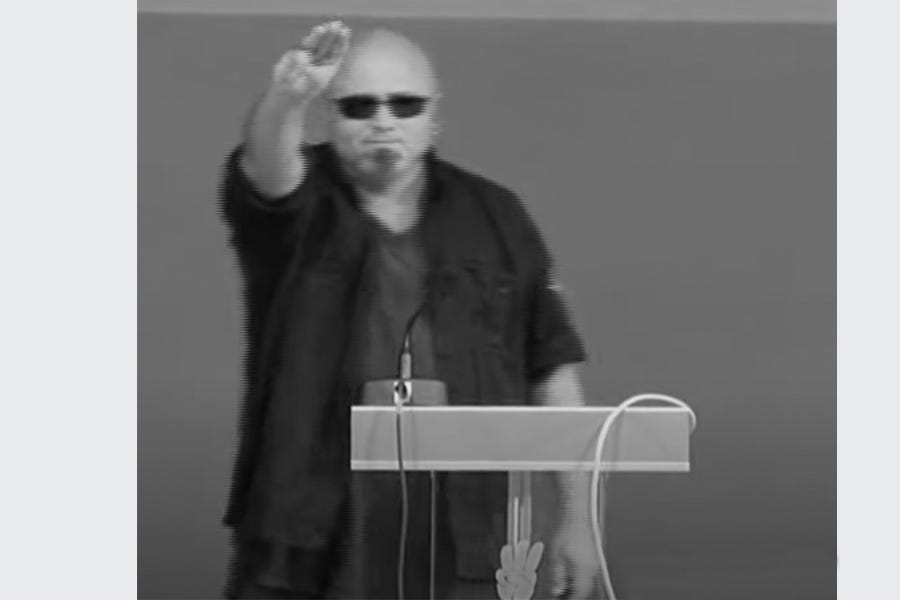
Along with Marko Suprun, Oleksandr Voitko, one of the leaders of the aggressive far-right group C14, is also in the photo. In 2018, C14 dispersed Roma settlements at Lysa Hora in Kyiv, burning their tents and belongings. In a video published a few days later by LB.ua, right-wing radicals were seen throwing stones at Roma and spraying them with tear gas, driving them down the street.
There are also many C14 adherents involved in serious criminal cases. In particular, its members Andriy Medvedko and Denys Polishchuk are accused of killing Oles Buzyna, the former editor-in-chief of the Segodnya newspaper and a pro-Russian writer who had spoken out in support of the Kremlin’s policy of occupying Donbass. Both participants in the “Buzyna case” were released from custody, Polishchuk — on bail of 5 million UAH.
In November 2017, the Terrorism Research & Analysis Consortium TRAC, which studies terrorism and political violence, published an article on C14. The group was not included in the list of terrorist groups, but the consortium became interested in the organization.

Marko Suprun and the Right Sector
Marko Suprun has long been friends with Dmytro Savchenko, a spokesman for the far-right Right Sector party. The latter is also the founder of the Iron Father publishing house, where the ideologue of “Christian national anarchism” DmytroKorchynsky publishes his works. Korczynski once said that his Brotherhood party sought to create an “Orthodox Taliban” in Ukraine. There are also a bunch of photos with the symbols of the Carpathian Sich on the Iron Father’s Facebook page. It is an aggressive Transcarpathian far-right group whose members attack the LGBT community, feminists and people with mental disabilities.
In February 2018, Suprun and Savchenko together celebrated the 30th anniversary of the band Komu Vnyz on Independence Square, which was also attended by Dmytro Korchynsky. A year later, Dmytro Savchenko and Arseniy Bilodub appeared outside the Kyiv District Administrative Court, where the case of the removal of acting Minister of Health Ulyana Suprun was to be considered. Savchenko took a joint photo with Marko and Bilodub.
Dmytro Savchenko served 10 years for a terrorist act — an explosion at the Troieshchyna market in Kyiv, which killed a man. He was released along with political prisoners in 2014, but was not granted amnesty. He did not admit his guilt.
What the experts say
Marko Suprun’s friendships are his own personal business. However, it is another matter if this affects his work at StopFake, a journalistic project that should be as objective and impartial as possible. According to experts interviewed by Zaborona, questions have been raised recently.
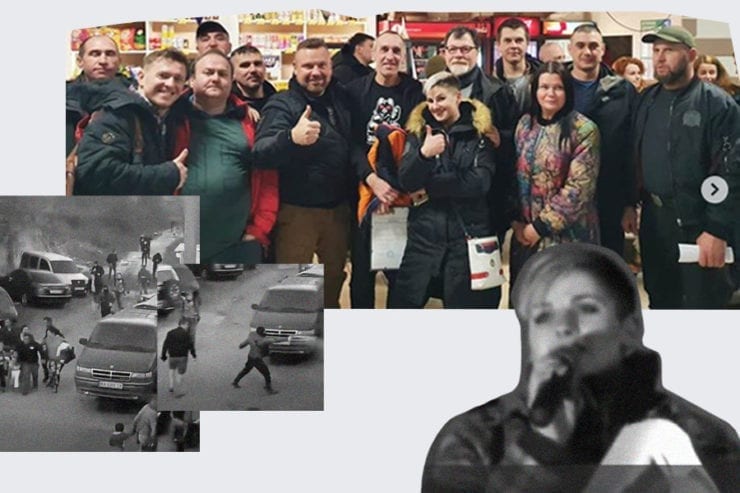
Researcher of right-wing radical movements Anton Shekhovtsov notes that in recent years StopFake has become “too politicized.” This was especially noticeable during the presidential campaign in 2019, he said. We studied some StopFake publications from that period — in fact, the project often refuted fakes about the then head of state and presidential candidate Petro Poroshenko. However, some publications were a bit strange and did not correspond to the level that StopFake demonstrated at the beginning of its activity. For example, they denied the “fake” that Poroshenko refused to debate at the stadium with Volodymyr Zelenskiy, that it was rather a manipulation by the Russian media. During the election, StopFake also drew attention to the exit poll from one organization, indicating that it was registered a few weeks before the election. However, the data of this sociological service that Poroshenko received a little more than 20% of the vote, and Zelensky — a little more than 70%, turned out to be accurate.
“Earlier, in 2014–2015, StopFake was really very useful, but then in the following years the project became politicized. Now, they have a national-patriotic discourse,” says Shekhovtsov.
BuzzFeed journalist Christopher Miller has no doubt that contacts with the far-right environment affect the positions of Yevhen Fedchenko and Mark Suprun on hate groups and StopFake’s coverage of them.
“StopFake co-founder Yevhen Fedchenko saw criticism of far-right groups by international and Ukrainian journalists as ‘fake news’ and ‘echoes of Russian propaganda,’” Miller tells Zaborona. “Suprun’s role in StopFake, when Poroshenko was in power and his wife was acting health minister, can also be seen as a conflict of interest, as the Internet resource adhered to the government’s position on all issues.”
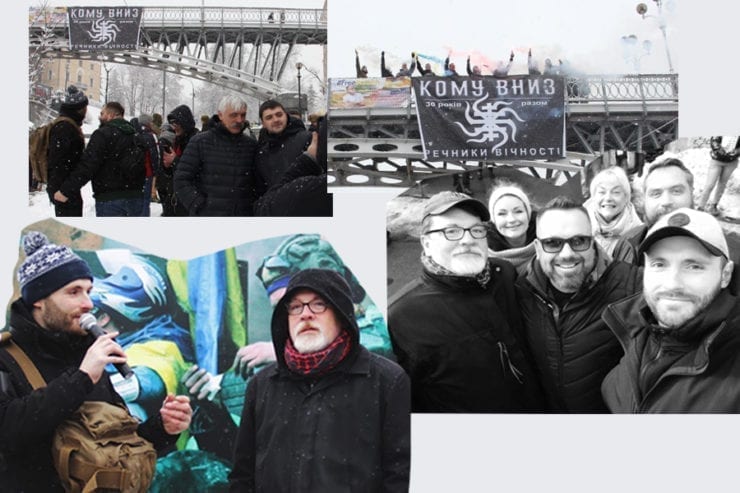
StopFake responded to the manipulative news of Strana.ua about the formation of the Municipal Guard in Kyiv, which claimed that “the far right group will check documents in Kyiv transport” during quarantine. StopFake responded with an equally dubious publication, which shows an attempt to whitewash the image of the Municipal Guard. Following “Strana.ua”’s accusation about a number of persecutions of the Roma community by Kyiv municipalities, StopFake denied the participation of the Municipal Guard in the pogrom on Lysa Hora, referring to the statement of the “guard” itself. And taking into account that «Strana.ua» has not mentioned anything about this incident — the resource wrote about the attacks on Roma people with only general phrases and referred to the comment of the head of the patrol police Yuriy Zozulia: «We cannot work with people who profess racial hatred.”
“Being able to control the ‘visibility’ of different content is a great temptation, and the presence of strong personal and political sympathies can be a motive for abuse”, says Vyacheslav Likhachev, a researcher of far-right movements and coordinator of the Group for Monitoring the Rights of National Minorities. “For example, why not mark it a post as fake, for the sake of friendly relations, which reminds us that Diana Vinogradova (Kamlyuk) served a term for complicity in a racist murder, if she herself claims that it was “political persecution”? Why not help Dmytro Savchenko blunder less often against reminders of ten years of imprisonment, carried out after an unsuccessful attempt to organize a ‘sacred racial war’ in Troieshchyna, during which a market cleaner died? “
Likhachev says he has not noticed such bias on StopFake’s Facebook posts, but is convinced that if members of the organization responsible for monitoring the authenticity of content were constantly seen in the company, for example, of those such as Anatoly Shariy or Viktor Medvedchuk, “the scandal would have erupted not only in the Ukrainian segment of Facebook”.
“However, a well-developed algorithm, clear criteria and the presence of people with different views in the team can minimize the risk of bias of moderators,” says Likhachev. “And the main thing, surely, is the maximum transparency of the evaluation criteria, mechanisms and justification of the decisions made in general, and in each case of a potential conflict of interest — especially.”
Maksym Butkevych, a human rights activist and coordinator of the Without Borders project, believes that, on the one hand, Marko Suprun does not work for StopFake as a Facebook moderator. And if he shares the goals, values of StopFake and is suitable for the tasks of the project — then this may be quite enough for the organization. On the other hand, the role of this Internet resource, created for an important and useful purpose, has now become even more important — in the context of cooperation with Facebook, and therefore, meticulous attention to the impartiality t of StopFake is quite natural.
“So, I think the relevant question to StopFake, from journalists in particular, would be quite logical and justified, and it is worth having an answer. This is, after all, useful for the project itself, its image and the audience’s understanding of its values,” says Butkevych.
Zaborona asked StopFake and its management to comment on Mark Suprun’s ties to the far right, as well as to deny or confirm their involvement in the removal of Zaborona’s post about the Neo-Nazi Nikitin, but received no response. We also wrote to Marko himself, and appealed to the representative of Facebook in Ukraine, Kateryna Kruk, but did not receive an answer. Zaborona is ready to provide a platform for expressing positions.




